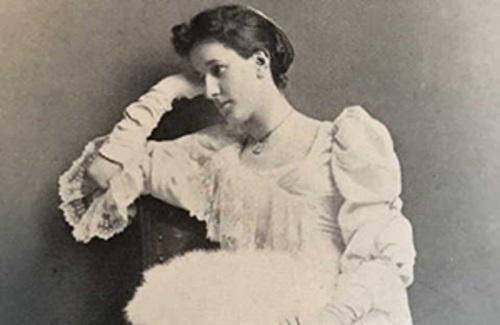Browse "Nature & Geography"
-
Article
Louis-Marie
Louis-Marie, Trappist priest, botanist, teacher (b Louis-Paul Lalonde at Montréal 17 Oct 1896; d there 3 Nov 1978).
"https://development.thecanadianencyclopedia.ca/images/tce_placeholder.jpg?v=e9dca980c9bdb3aa11e832e7ea94f5d9" // resources/views/front/categories/view.blade.php
https://development.thecanadianencyclopedia.ca/images/tce_placeholder.jpg?v=e9dca980c9bdb3aa11e832e7ea94f5d9
-
Article
Luke Fox
Luke Fox, also spelled Foxe, explorer (b at Kingston-upon-Hull, Eng 20 Oct 1586; d c 15 July 1635). He left for the Arctic in 1631, 2 days after Thomas JAMES left on a rival voyage.
"https://development.thecanadianencyclopedia.ca/images/tce_placeholder.jpg?v=e9dca980c9bdb3aa11e832e7ea94f5d9" // resources/views/front/categories/view.blade.php
https://development.thecanadianencyclopedia.ca/images/tce_placeholder.jpg?v=e9dca980c9bdb3aa11e832e7ea94f5d9
-
Article
Marcelle Gauvreau
Marcelle Gauvreau, Quebec scientist, botanist, educator, administrator, writer and journalist (born 28 February 1907 in Rimouski, QC; died 16 December 1968 in Montreal, QC). A botanist by profession, Marcelle Gauvreau made her mark as a teacher, writer, journalist, administrator and faithful collaborator of Frère Marie-Victorin (Conrad Kirouac). Through her books, articles, talks, the school she established, and her desire to promote public interest in plant life, she encouraged many Quebecers to learn about plants and to love nature in the 20th century.
"https://d2ttikhf7xbzbs.cloudfront.net/media/new_article_images/Marcellegauvreau/Marcelle_Gauvreau_1939.jpg" // resources/views/front/categories/view.blade.php
https://d2ttikhf7xbzbs.cloudfront.net/media/new_article_images/Marcellegauvreau/Marcelle_Gauvreau_1939.jpg
-
Article
Mary Edith Tyrrell
Mary Edith Tyrrell (née Carey), co-founder and first president of the Women's Association of the Mining Industry of Canada, writer (born 11 September 1870 in Saint John, NB; died 14 October 1945 in Toronto, ON). Tyrrell, along with 19 other women, founded the Women’s Association of the Mining Industry of Canada in 1921 to create a community among mining wives. Her work with the organization was an example of women’s indirect involvement in the mining industry. Tyrrell also published works about her experience joining her geologist husband, Joseph Burr Tyrrell, in Yukon during the Klondike Gold Rush.
"https://d2ttikhf7xbzbs.cloudfront.net/maryedithtyrrell/MET-Cropped.jpg" // resources/views/front/categories/view.blade.php
https://d2ttikhf7xbzbs.cloudfront.net/maryedithtyrrell/MET-Cropped.jpg
-
Article
Mary Schäffer Warren
Mary Schäffer Warren (née Mary Townsend Sharpless), naturalist, writer, photographer, surveyor (born 4 October 1861 in West Chester, Pennsylvania; died 23 January 1939 in Banff, AB). Schäffer Warren is best known for being the first non-Indigenous person to explore Maligne Lake in the Canadian Rockies. She was one of the first non-Indigenous women to travel through much of what is now Banff and Jasper national parks. Although she had no experience as a surveyor, the Geological Survey of Canada asked her to survey Maligne Lake in 1911. As a result, Schäffer Warren is responsible for naming several of the geographic features surrounding the lake (see also Ten Mountains in Canada Named After Women). Through writing and lantern-slide presentations of her hand-painted photographs, she encouraged tourism to the Rockies.
"https://d2ttikhf7xbzbs.cloudfront.net/MarySWarren/CampFire.jpg" // resources/views/front/categories/view.blade.php
https://d2ttikhf7xbzbs.cloudfront.net/MarySWarren/CampFire.jpg
-
Article
Mina Benson Hubbard
Mina Benson Hubbard (née Mina Benson, also Mina Benson Hubbard Ellis), explorer, geographer, author, nurse, teacher (born 15 April 1870 near Bewdley, ON; died 4 May 1956 in the County of Surrey, England). After her husband died while exploring the interior of Labrador, Mina Benson Hubbard embarked on an expedition to complete his work. She completed the nine-week canoe journey through at least 900 km of Labrador in 1905. Hubbard was one of the first non-Indigenous people to travel extensively in the area. Using measurements and notes taken during her trip, she developed some of the first maps of the region.
"https://d2ttikhf7xbzbs.cloudfront.net/minabensonhubbard/Mina-Hubbard-sitting-on-tree-trunk.jpg" // resources/views/front/categories/view.blade.php
https://d2ttikhf7xbzbs.cloudfront.net/minabensonhubbard/Mina-Hubbard-sitting-on-tree-trunk.jpg
-
Editorial
Mina Benson Hubbard's Labrador Expedition
The following article is an editorial written by The Canadian Encyclopedia staff. Editorials are not usually updated.
"https://development.thecanadianencyclopedia.ca/images/tce_placeholder.jpg?v=e9dca980c9bdb3aa11e832e7ea94f5d9" // resources/views/front/categories/view.blade.php
https://development.thecanadianencyclopedia.ca/images/tce_placeholder.jpg?v=e9dca980c9bdb3aa11e832e7ea94f5d9
-
Article
Morley Keith Thomas
Morley Keith Thomas, climatologist (born 19 August 1918 near St. Thomas, ON; died 31 March 2018 in Watford, ON). Morley K. Thomas is recognized as an authority on both the practical and scientific aspects of climatology.
"https://development.thecanadianencyclopedia.ca/images/tce_placeholder.jpg?v=e9dca980c9bdb3aa11e832e7ea94f5d9" // resources/views/front/categories/view.blade.php
https://development.thecanadianencyclopedia.ca/images/tce_placeholder.jpg?v=e9dca980c9bdb3aa11e832e7ea94f5d9
-
Article
Mountenay William Du Val
Mountenay William Du Val, (b at Île Bonaventure, Qué 30 Jan 1883; d at Mont-Joli, Qué 22 Feb 1960) and Matilda Clara Du Val, née Mauger (b at Île Bonaventure, Qué 4 Oct 1884; d at Montréal 13 Dec 1954). The Du Vals were both of Channel Island and Irish background and were raised at ILE BONAVENTURE.
"https://development.thecanadianencyclopedia.ca/images/tce_placeholder.jpg?v=e9dca980c9bdb3aa11e832e7ea94f5d9" // resources/views/front/categories/view.blade.php
https://development.thecanadianencyclopedia.ca/images/tce_placeholder.jpg?v=e9dca980c9bdb3aa11e832e7ea94f5d9
-
Memory Project Archive
Robert Francis "Frank" Power (Primary Source)
Please be advised that Memory Project primary sources may deal with personal testimony that reflect the speaker’s recollections and interpretations of events. Individual testimony does not necessarily reflect the views of the Memory Project and Historica Canada.
"https://d2ttikhf7xbzbs.cloudfront.net/The-Memory-Project/image/4941_original.jpg" // resources/views/front/categories/view.blade.php
https://d2ttikhf7xbzbs.cloudfront.net/The-Memory-Project/image/4941_original.jpg
-
Article
Onkar Prasad Dwivedi
Onkar Prasad Dwivedi, CM, political scientist, environmentalist (born 20 January 1937 near Bindki in Uttar Pradesh province, India; died 29 January 2013 in Guelph, ON). Dwivedi was known for his research in public administration and the environment. He contributed widely to both his academic field as well as his community, both in Guelph and abroad.
"https://development.thecanadianencyclopedia.ca/images/tce_placeholder.jpg?v=e9dca980c9bdb3aa11e832e7ea94f5d9" // resources/views/front/categories/view.blade.php
https://development.thecanadianencyclopedia.ca/images/tce_placeholder.jpg?v=e9dca980c9bdb3aa11e832e7ea94f5d9
-
Article
Paul Watson
Paul Franklin Watson, environmental activist, author, reality TV star (born 2 December 1950 in Toronto, ON). Paul Watson is the founder of the Sea Shepherd Conservation Society (SSCS) and a pioneering, polarizing figure in the conservation movement.
"https://development.thecanadianencyclopedia.ca/images/tce_placeholder.jpg?v=e9dca980c9bdb3aa11e832e7ea94f5d9" // resources/views/front/categories/view.blade.php
https://development.thecanadianencyclopedia.ca/images/tce_placeholder.jpg?v=e9dca980c9bdb3aa11e832e7ea94f5d9
-
Article
Pehr Kalm
Pehr Kalm, botanist (b in Sweden 6 Mar 1716; d in Finland 16 Nov 1779). Kalm was educated in Finland and Sweden. He met the leading European naturalist, Linnaeus, in 1741, and under his influence became an expert on botanical applications to agriculture.
"https://development.thecanadianencyclopedia.ca/images/tce_placeholder.jpg?v=e9dca980c9bdb3aa11e832e7ea94f5d9" // resources/views/front/categories/view.blade.php
https://development.thecanadianencyclopedia.ca/images/tce_placeholder.jpg?v=e9dca980c9bdb3aa11e832e7ea94f5d9
-
Article
Raoul Blanchard
Raoul Blanchard, geographer (b at Orléans, France, 1877; d at Paris 1965). He was considered the father of modern geography in Québec, and exercised a profound influence on the future founders of geography departments at universities in Montréal and Québec.
"https://development.thecanadianencyclopedia.ca/images/tce_placeholder.jpg?v=e9dca980c9bdb3aa11e832e7ea94f5d9" // resources/views/front/categories/view.blade.php
https://development.thecanadianencyclopedia.ca/images/tce_placeholder.jpg?v=e9dca980c9bdb3aa11e832e7ea94f5d9
-
Article
Rob Stewart
Robert Stewart, director, writer, photographer, conservationist (born 28 December 1979 in Toronto, ON; died 31 January 2017 near Islamorada, Florida). Rob Stewart was an ecologically-minded non-fiction filmmaker, conservationist and activist who was fascinated since childhood by underwater life and photography. His environmental documentaries Sharkwater (2006) and Revolution (2012) set box office records in Canada and won numerous awards worldwide. Stewart was reported missing on 31 January 2017 while diving in the Florida Keys and was found dead after a three day search. The Canadian Screen Award for Best Science or Nature Documentary Program or Series was renamed in his honour.
"https://d2ttikhf7xbzbs.cloudfront.net/media/media/f0b248b9-32c3-425a-82a9-8b77d0e3c4b5.jpg" // resources/views/front/categories/view.blade.php
https://d2ttikhf7xbzbs.cloudfront.net/media/media/f0b248b9-32c3-425a-82a9-8b77d0e3c4b5.jpg
